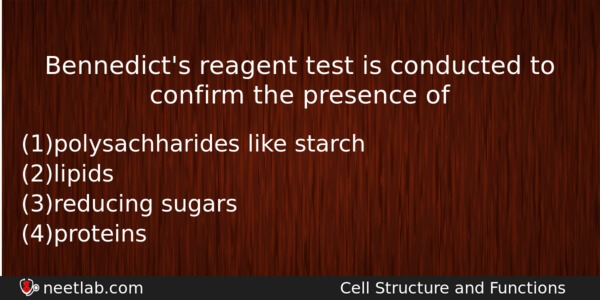| ⇦ | 
| ⇨ |
Bennedict’s reagent test is conducted to confirm the presence of
Options
(a) polysachharides like starch
(b) lipids
(c) reducing sugars
(d) proteins
Correct Answer:
reducing sugars
Explanation:
All those sugars which have free aldehyde or ketone group are called reducing sugars. These are able to reduce cupric ions (Cu⁺²) into cuprous ions (Cu⁺). The two common test are Benedict’s test and Fehling’s test. Both tests employ alkaline solution of copper sulphate which is blue in colour with reducing sugar it gives orange to brick red precipitation. Galactose is a reducing sugar. It gives brownish red precipitate wiht Fehling reagent and wiht Benedict’s reagent it gives yellow, red or green precipitate confirming the presence of sugar. Sucrose, starch are non-reducing sugars.
Related Questions: - In mitochondria cristae act as sites for
- Minamata disease first occurred in
- In an inducible operon, the genes are
- About which day in a normal humans menstrual cycle does rapid secretion of LH
- Ninetenth of all photosynthesis in the world 8590 is carried out by
Topics: Cell Structure and Functions
(413)
Subject: Biology
(4253)
Important MCQs Based on Medical Entrance Examinations To Improve Your NEET Score
- In mitochondria cristae act as sites for
- Minamata disease first occurred in
- In an inducible operon, the genes are
- About which day in a normal humans menstrual cycle does rapid secretion of LH
- Ninetenth of all photosynthesis in the world 8590 is carried out by
Topics: Cell Structure and Functions (413)
Subject: Biology (4253)
Important MCQs Based on Medical Entrance Examinations To Improve Your NEET Score
18000+ students are using NEETLab to improve their score. What about you?
Solve Previous Year MCQs, Mock Tests, Topicwise Practice Tests, Identify Weak Topics, Formula Flash cards and much more is available in NEETLab Android App to improve your NEET score.
Share this page with your friends

Leave a Reply